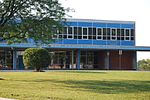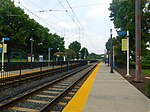"Mount Winans" ("Mt. Winans") is a mixed-use residential, commercial and industrial neighborhood in the southwestern area of the City of Baltimore in Maryland. Its north, south and east boundaries are marked by the various lines of track of the CSX Railroad (formerly the historic Baltimore and Ohio Railroad before 1987, and later briefly, the "Chessie System"). In addition, Hollins Ferry Road running to the south towards suburban Baltimore County in the southwest and further connecting with adjacent Anne Arundel County to the southeast, draws its western boundary.
The neighborhood was named after Ross Winans, (1796-1877), a famous inventor of railway steam engines for the old Baltimore and Ohio Railroad at its beginnings in 1828 and later other American lines when he later set up foundries and shops adjacent to the B. & O.'s "Mount Clare Shops" on West Pratt Street in the later named Mount Clare, Union Square and Poppleton neighborhoods of southwest Baltimore. Winans was also a major industrialist partnering with similar New York City inventor and industrialist Peter Cooper, who developed the first steam-powered locomotive for the Baltimore & Ohio, the famous "Tom Thumb" of 1830. Cooper and Winans later were involved in the southeast Baltimore industrial and port development beginning in the 1820s, further east of historic Fells Point, the earlier colonial-era and late 18th Century shipbuilding and trade district of the City. Along the northern shore of the Northwest Branch of the Patapsco River and Baltimore Harbor, the new district was titled "Canton", named for the famous southern Chinese city by the "Canton Company", founded by Capt. John O'Donnell and his descendants, a ship captain who returned in the 1780s and 90s with the first cargoes on Yankee merchant ships to Maryland from the new markets and trade in Asia.










